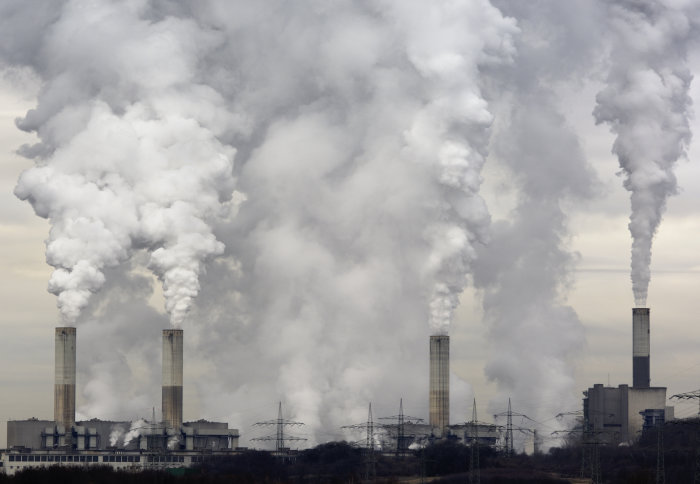Immediate fossil-fuel phase out could help limit global warming to 1.5°C

New research suggests a two-thirds chance of avoiding dangerous global warming above 1.5°C if fossil-fuel infrastructure is immediately phased out.
An international team, including researchers from Imperial College London and led by the University of Leeds, have used a new climate model to determine what would happen to global temperatures if carbon-intensive infrastructure like fossil fuel power plants, cars, aircraft, ships and heavy industries had begun to be phased out at the end of 2018.
The study, published yesterday in Nature Communications, supposed that the carbon-intensive items began to be replaced with zero-carbon alternatives at the end of their design lifetime – the point where they would require large scale refurbishments or maintenance to keep running – rather than more carbon emissions being ‘locked-in’ with further investment and expansion.
“Every year we delay phasing out this infrastructure makes the fossil fuel ‘lock-in’ harder to get out of and the possibility of keeping global temperature rise below 1.5°C less likely.” Dr Chris Smith University of Leeds
The team found that in this scenario, the carbon dioxide (CO2) emissions would steadily decline, dropping to near zero in 40 years. This outcome, they say, would mean a 64% chance of limiting global average temperature rise to 1.5°C above pre-industrial levels.
Study lead author Dr Chris Smith, from the University of Leeds, said: “All fossil fuel infrastructure, such as coal power plants, carries a climate change commitment. A new coal plant will emit CO2 for roughly 40 years across its lifecycle which in turn affects global warming.
“Investments into carbon-intensive infrastructure and their development and maintenance lock us in to the associated carbon emissions and make the transition to lower-carbon alternatives more difficult.
“Our research found that the current amount of fossil fuel infrastructure in the global economy does not yet commit us to exceeding the 1.5°C temperature rise limit put forward by the Paris Agreement. We may have missed starting the phase out by the end of 2018, but we are still within the margin of achieving the scenario the model put forward.
“Every year we delay in phasing out this infrastructure makes the fossil fuel ‘lock-in’ harder to get out of and the possibility of keeping global temperature rise below 1.5°C less likely.”
“Behind the necessary phase-out of carbon-emitting infrastructure lies a deeper, human story... [The transition] can be a challenge for communities whose economies are heavily reliant on soon-to-be outdated technologies.” Dr Joeri Rogelj Grantham Institute
The study focused on energy generation, transport and industrial sectors, which are responsible for 85% of global emissions and also have the best data available about the CO2 emissions for their historical lifetimes. It assumed the technologies responsible for these emissions would be immediately phased out as the global economy switches to zero-carbon electricity such as renewables and nuclear, and would see transport switch to electric alternatives.
However, this scenario would affect every sector in the global economy and would therefore require careful planning by policy-makers. Dr Joeri Rogelj, co-author and a Lecturer at the Grantham Institute – Climate Change and the Environment, noted that “behind the necessary phase-out of carbon-emitting infrastructure lies a deeper, human story.
“The transition away from a world dominated by fossil fuels is driven by the need to halt climate change, however, this technical transition from carbon-intensive activities to low-carbon solutions can be a challenge for communities whose economies are heavily reliant on soon-to-be outdated technologies. Any transition will require careful attention to ensure it is just and equitable for everyone involved.”
The authors also acknowledged that their results assume that no large-scale climate tipping points are breached in the coming decades, such as large amounts of CO2 being released from extensive permafrost melting.
In an article written for The Conversation, Dr Smith explains the details of the research findings and the necessity of phasing out fossil fuel infrastructure immediately.
The paper 'Current fossil fuel infrastructure does not yet commit us to 1.5 °C warming’ by Christopher J. Smith, Piers M. Forster, Myles Allen, Jan Fuglestvedt, Richard J. Millar, Joeri Rogelj & Kirsten Zickfeld was published yesterday in Nature Communications.
Read the Grantham Institute's briefing paper: Towards a just and equitable low-carbon energy transition
Top image credit: iStock/acilo
Article text (excluding photos or graphics) © Imperial College London.
Photos and graphics subject to third party copyright used with permission or © Imperial College London.
Reporter
Ms Abbie Stone
Centre for Environmental Policy